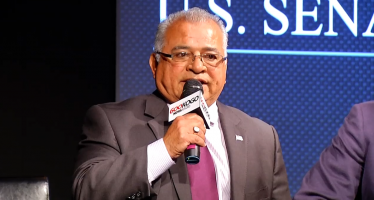LAO’s budget reality check
Jan. 13, 2009
By JOHN SEILER
Time for a reality check on the budget. That comes from the state Legislative Analyst’s Office, a non-partisan oasis in the middle of the partisan desert of state government. The LAO’s January 12 analysis of the Gov. Arnold Schwarzenegger’s budget proposal for the 2010-11 fiscal year, which begins on July 1, will be the basis for talks about the budget.
It finds that the governor’s assumption of a $18.9 billion deficit for the remainder of the 2009-10 fiscal year and all the 2010-11 year “is reasonable.” However, it also notes that the LAO’s own estimate in November 2009 set the “budget problem at $20.7 billion.” The $1.8 billion gap between the two estimates was because “the governor’s baseline estimates of both revenues and expenditures are somewhat more optimistic than ours.”
The conclusion:
The main reasons for the budget gap are similar to the ones we identified in our November 2009 report, California’s Fiscal Outlook: the inability of the state to achieve previous budget solutions in several areas, the effects of several adverse court rulings, and, for 2010–11, the expiration of various one–time and temporary budget solutions approved in 2009.
In Sacramento, the latter are called “gimmicks” and are a major reason the budget seldom gets in balance because legislators and governors refuse to make the hard decisions needed.
“The problem is the governor’s budget is based on a whole set of assumptions from last year,” concurred John Ellwood, professor of public policy at the Goldman School of Public Policy at the University of California, Berkeley. “In solving last year’s problem,” he said of the governor and the Legislature, “they didn’t really solve it.” He pointed out that California has one of the weakest “balanced budget” requirements of the 50 states, requiring only that the budget be balanced “on paper,” not in reality.
The LAO describes how the governor proposes to deal with the $18.9 billion deficit – plus a $1 billion reserve – for a total of $19.9 billion in proposed solutions:
* $7.6 billion in cuts. These depend on the will of the governor and Legislature actually to make the cuts.
* $4.5 billion in “other solutions” – the infamous “gimmicks” – such as: “Use Proposition 10 funding in various children’s programs,” saving $600 million. Prop. 10 is the 50-cent tax on each pack of cigarettes, which funds children’s health programs. This proposal would shift that money to K-12 education for one year. That and some other proposals would require the approval of voters in the June primary election.
* $6.8 billion in federal funds.
Federal funding
A key element in the governor’s budget is the attempt to get federal funding. It’s a kind of welfare for the state – “free” money that doesn’t have to be paid back.
The LAO’s conclusion:
We believe there is a good prospect for the state receiving some significant new federal relief — perhaps several billion dollars worth — that will help balance the 2010–11 budget…. Nevertheless, the chance that anywhere near all of the federal funds and flexibility sought by the governor in his budget package is almost nonexistent. The state is very likely to fall several billion dollars short of the governor’s goals.
If the goals aren’t met, the governor’s budget includes various proposals to “trigger” tax and fee increases and more spending cuts to make up the difference.
“That’s obvious,” Elwood said of the conclusion that state won’t get what the governor is asking of the feds. Gov. Pete “Wilson used to do this all the time,” especially asking for money for the expenses caused by illegal immigrants, such as incarceration in prisons, but didn’t get much, either. Wilson was governor from 1991-1998. “These are pleas. But I have friends in other states who look at the problems they’re having at home, and say, ‘You have it pretty good out there in California.’ I don’t think we’re loved in other parts of the country.” He said there might be “a generic bailout bill” of all the states, but that’s far from certain.
A different view comes from Esmael Adibi, director of the A. Gary Anderson Center for Economic Research and Anderson Chair of Economic Analysis at Chapman University. “I think they’re going to get the money” as part of the federal stimulus package, he told me. He pointed out that something similar happened with last year’s budget. K-12 education supposedly was cut, “but practically didn’t get much of a cut” because the federal money sent to California by President Obama.
This time, the governor is proposing K-12 funding cuts of $893 million for the remainder of fiscal 2009-10 and $1.5 billion for 2010-11. California does have some of the most powerful legislators in Congress, including House Speaker Nancy Pelosi, D-San Francisco, and senators Dianne Feinstein and Barbara Boxer.
When Gov. Schwarzenegger recently chided the federal government for being stingy with aid to California, Feinstein retorted, “It sounds like the governor is looking for someone else to blame for California’s budget. California’s budget crisis was created in Sacramento, not Washington. These problems are not going away until there is wholesale reform of the state’s budget process.” But that statement didn’t preclude her fighting to get the money for her state.
Taxes and fees
The LAO report counsels against increasing income tax rates, which already are the highest in the country. As mentioned, should the state not get enough federal money, the governor proposed several “triggers” that would increase taxes and fees. The LAO thinks such taxes and fees are a good idea even without the “trigger” being pulled:
For example, we urge consideration for extending the dependent personal income tax credit reduction, a proposal on the governor’s trigger list—perhaps even on a permanent basis. In addition, modification or elimination of tax expenditure programs — special credits, deductions and exemptions — that are not cost–effective can raise revenues without resulting in marginal tax rate increases.
But the problem, Adibi warned, is that “all of these make the cost of doing business in California more expensive. Last year they increased the vehicle license fee, the sales tax and the personal income tax. Ultimately, all these taxes make the private sector weaker. They increase government, which is inefficient.”
The long-term problem
The real problem is that permanent cuts are needed in the state budget, Adibi said. All the federal aid does is postpone the day of reckoning. Some year, the federal money will no longer be available.
When the federal money finally is cut off, state spending still will be at an unsustainable level, and finally will have to be cut to a level that can be afforded by the tax base. Of course, when that happens, Gov. Schwarzenegger and many in the state Legislature will be gone from office.
In the meantime, the LAO urges the governor and Legislature to “agree to a framework” on the budget by March, so that they can take effect as quickly as possible. But given that in recent years budgets almost never have met even the June 15 constitutional deadline, that may difficult to achieve. And the LAO itself noted in its November budget analysis, “In 2008 and 2009, the state repeatedly approached insolvency — unable at times to meet some of its basic financial obligations in a timely way.”
Elwood said that, because there’s no effective balanced-budget requirement, “I predict that after much moaning and groaning the Legislature will pass and the governor will sign a budget that is not in deficit. At the end of the fiscal year expenditures will exceed revenues. This shortfall will be rolled over into the next fiscal year.”
Some year, financial reality eventually will force the state government to reform its dysfunctional budget process. Unless something fundamental changes soon, 2010 will not be that year.
John Seiler, an editorial writer for 19 years at The Orange County Register, currently is a freelancer who writes for Calwatchdog. His email: [email protected].
Related Articles
CA budget worse despite $2 billion new revenue
California’s budget picture is sort of like that old Sandy Dennis high-school movie, “Up the Down Staircase.” Going up: Legislative Analyst
Chavez drops Senate campaign, recommits to Assembly
In dramatic fashion, Assemblyman Rocky Chavez announced Monday he was suspending his campaign to replace the retiring Democratic Senator Barbara Boxer
Prop 24: Fairness or Penalty?
SEPT. 30, 2010 By KATY GRIMES It’s not so unusual to hear people making disparaging comments about one another at




